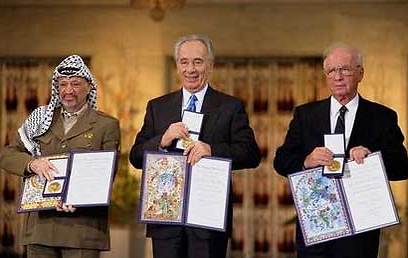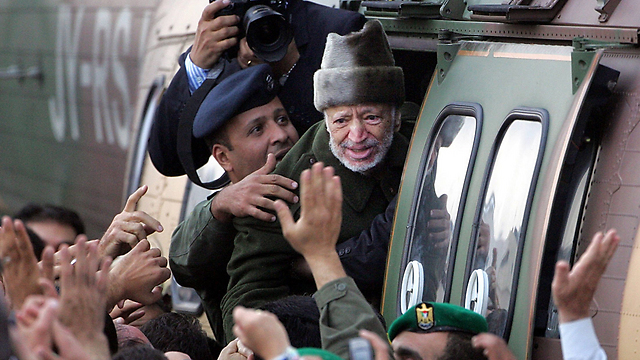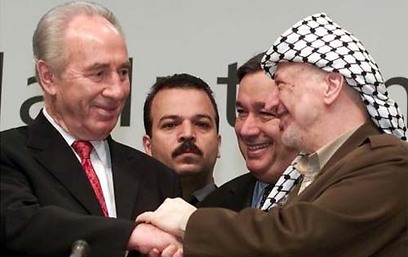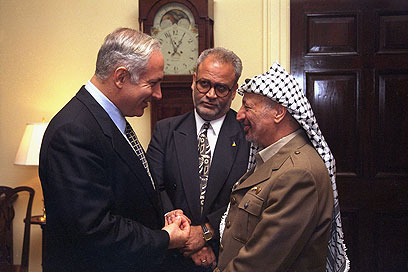
Arafat - arch-terrorist or peacenik?
10 years after the death of the Palestinian leader, Israelis are still divided in their view of him; Arafat was the one who 'really made the breakthrough in relations with Israel' and opened the way for a two-state solution to become reality.
For most Israelis, the late Yasser Arafat and his trademark black-and-white keffiyeh represents the embodiment of the "arch-terrorist". But a minority in Israel look back fondly on the former Palestinian leader - who died 10 years ago this week - as the man who dared to sign an peace accord with the Jewish state.
For decades, any Israeli making contact with the Palestinian Liberation Organization (PLO) that Arafat led could be thrown in prison. In 1993, however, all that changed with the Oslo peace accords, which transformed the PLO into a legitimate political force.
But if the rapprochement brokered by the Oslo treaty was a welcome development for two peoples wearied by decades of war, the second Palestinian intifada, which began in 2000, reminded Israelis that Arafat remained the enemy, experts said.
"A large majority of Israelis think of Yasser Arafat as the main culprit behind the violence and he undermined the confidence they had in the Palestinians' desire for peace," said Anat Kurz, research director at the Institute for National Security Studies at Tel Aviv University.
Uzi Dayan, a former national security advisor during the Arafat era, is more forthright, calling the Palestinian icon a "terrorist" and a "crook".
"He was never ready to conclude a deal that would put a final end to the conflict," Dayan said.
"He only wanted an arrangement on the borders (of a Palestinian state) before moving on to the real subjects close to his heart: the right of return for Palestinian refugees and East Jerusalem," the military reservist added.
"Israel would have no more ammunition after the borders (were set)."
The idea that Arafat was not serious about peace is not universal among Israelis, however.
"Contrary to what most Israelis think, I consider Arafat as a great leader, a real revolutionary who managed to put the Palestinian issue on the Middle East map and make it important globally," Kurz told AFP.
"He had no viable successor capable of making peace," she added.
'Icon of the revolution'
Uri Savir, co-founder of the Shimon Peres Center for Peace - named after Israel's former president who shared the Nobel Peace Prize with Arafat for the Oslo accords - met the Palestinian leader on several occasions.

"I'm one of those rare Israelis who doesn't have a negative image of Arafat," he says. "It doesn't make me popular, but I don't care.
"Arafat is an icon of the revolution, he had no taboos," Savir adds.
Arafat's strength lay in "surrounding himself with good people," he says.
"He chose the best negotiator for the Oslo Accords, in the form of Abu Alaa," he says referring to Ahmed Qreia, who later briefly served as Palestinian prime minister.
"He was better as a leader and negotiator than as a builder of modern state institutions. He was not the Palestinian Ben-Gurion," he said, referring to David Ben Gurion, who played a major role in Israel's establishment and became the Jewish state's first prime minister.
Savir is also critical of Arafat's relaxed stance towards the Islamist Hamas movement.
"He didn't understand the strategic danger posed by Hamas. I had long discussions with him on the subject and each time he told me: 'Don't worry.' He was wrong, as events have proved," says Savir, referring to events of 2007 when Hamas forcibly ousted Arafat's Fatah movement from Gaza.
No Arafat
In spite of Arafat's perceived shortcomings, he was the one who "really made the breakthrough in relations with Israel" and opened the way for a two-state solution to become reality, Savir adds.
Like Dayan, Savir sees clear differences between Arafat and his successor, Mahmoud Abbas.
"Abbas doesn't have the unifying character that Arafat did," he says.
"He's a more moderate, Western-style figure, but he lacks the ability to make decisions."
For Dayan, Abbas is "too weak" to make the tough decisions necessary to broker peace with Israel.
"It is precisely this fear of Hamas that leaves him even less flexible than Arafat on borders, the right of return (for Palestinian refugees), and Jerusalem," he concluded.














